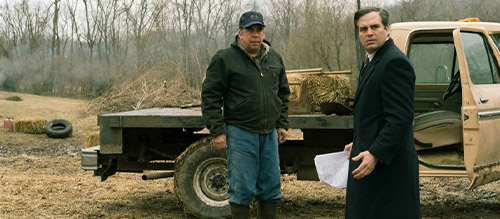Dark Waters (2020) Review
Dark Waters (2020)
Director: Todd Haynes
Screenwriter: Mario Correa, Matthew Micheal Carnahan
Starring: Mark Ruffalo, Anne Hathaway, Tim Robbins, Bill Camp, Victor Garber, Mare Winningham, Bill Pullman
Mark Ruffalo is no stranger to the ‘They Knew’ thriller genre having previously starred in the 2015 Best Picture Oscar winner Spotlight. And, much like that earlier critical success, the actor’s latest film Dark Waters turns from your garden variety legal thriller into something much bigger and much scarier than it may at first seem, his character Robert Bilott advancing from a conspiracy theory handed to him during a family favour, to attempting to prove that DuPont is responsible for polluting a water supply.
Dark Waters makes no secrets of playing on elements of the horror side of the thriller genre. Its opening, which depicts a group of teenagers in 1975 breaking into DuPont land to swim in a lake, reads like the start of a classic horror film, encouraging you to wonder which monster may be awaiting them in the water. Upon being chased away by the EPA during their discovery of a deformed frog, we are left to contemplate how Dark Waters is about a horrific monster, only this one isn’t supernatural and is instead a very powerful real life villain.
Based on the New York Times magazine article “The Lawyer Who Became DuPont’s Worst Nightmare” by Nathaniel Rich, Dark Waters is the 2020 Oscar season’s second major film release to be based upon a magazine article (the other being A Beautiful Day in the Neighbourhood), and is therefore tied to some over-drawn conventions of the legal thriller genre. As such, Ruffalo’s character Bilott goes through the motions of any lawyer uncovering something vitally important on film – he is presented with information, fights his own conscience and everybody sensibly telling him to walk away, and then he finally goes after the truth, teaching us values as he learns them for himself.
Thankfully, the film does not become a victim to the ‘true life’ investigation film tropes that we saw earlier this year in Just Mercy. Director Todd Haynes has you so on edge that you hold your breath while Bilott looks through boxes and boxes of evidence. You wish for him to find just a slither of something to go on, because we have already been shown the real evidence in the form of small-town farmer Will Tennant’s (Camp’s) diseased animals and his children’s discoloured teeth.
When Bilott gathers more and more evidence, we begin to see what is really going on, and it’s much bigger than any one farm in a rural community.
In a revelation brought on by an innocent looking advertisement for a frying pan, Bilott jumps back like he has seen a ghost. DuPont is the monster of this monster movie.
Shot in yellow and grey tones, everything and everyone looks sick and toxic in Dark Waters. Bilott’s increasing paranoia and shakes gives the film the feel of an infestation horror, and the more it progresses and the more that the character uncovers, the more you realise that what you’re watching on the screen has affected you without you even knowing it. And, much like the panicked expression and literal loss of breath that accompanies Rufallo’s performance at vital moments, you are left gobsmacked as you realise there’s nothing you can do about it; that is just one example of what large corporations have done and continue to do.
Dark Waters is by no means a perfect film however. Anne Hathaway as Bilott’s wife Sarah is given very little to do, and as such an impassioned speech in which she tells Robert’s boss ‘not to talk to her like she is the wife’ (when she has spent the last 90 minutes of the film being ‘the wife’) feels forced if not entirely fake. Although a lawyer herself, she is included in the film to simply support and look after the kids, the most important of her moments being included only to push the film to its next plot point, herself acting as a plot device and little more. This characterisation notably let down both the film and Anne Hathaway, an actress usually more reliable when choosing meaningful roles.
Generally, despite issues with Hathaway’s characterisation, Dark Waters is a refreshing take on the legal thriller genre, and one of those films that demonstrates the power that any one person can have. But take note, for there is no comfort given, there is no uplifting resolution in which our hero beats the bad guy. In fact, there are so many false endings and near misses that you, like Billot, feel exhausted by the end. Even now, in 2020, the fight against DuPont is not over – a fact that will leave you gasping as you leave, just as you have the whole way through.
Dark Waters does not offer hope or comfort but demands that you keep fighting. It is a meaningful film largely presented to a very high standard that is likely to be a problem for a lot of the people who deserve for it to be a problem. A moving portrait of a society that has lost its control of big business and must act instantly to change the structures in place.
17/24


